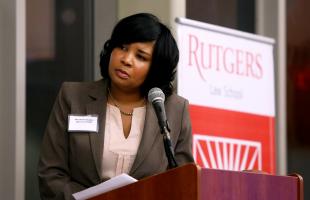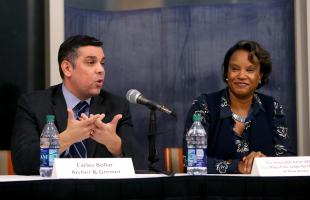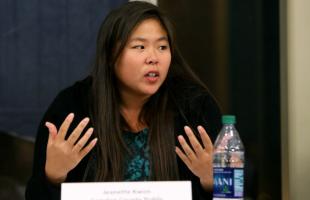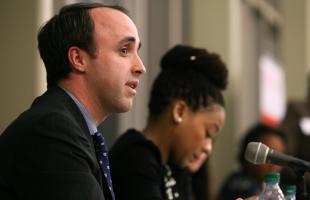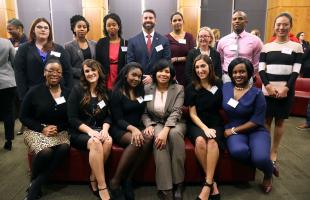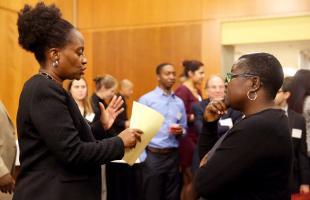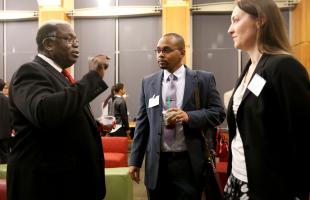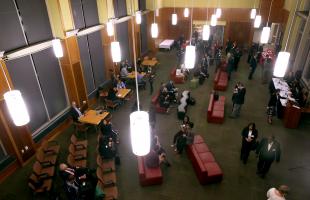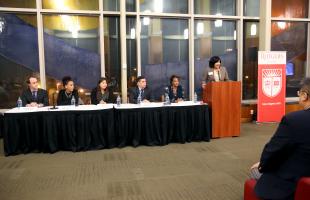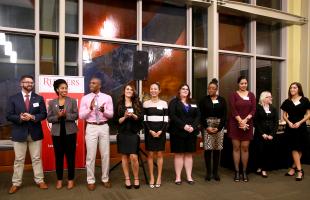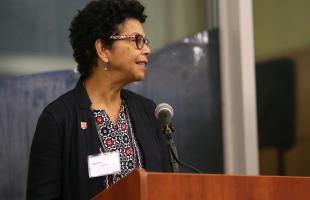Nearly 150 Rutgers Law alumni, current students, and members of the legal community attended a panel discussion about diversity in the workplace on Friday, November 18. Sponsored by Alianza, Asian-Pacific Law Students Association (APALSA), Black Law Students Association (BLSA), OUTLaws, and the Women’s Law Caucus, the event, which also included a networking reception, celebrated the launch of the Minority Student Program (MSP) in Camden.
Welcoming remarks were offered by Rutgers University–Camden Chancellor Phoebe Haddon, and Rutgers Law School Co-Deans Michael Cahill and Ron Chen, who was enrolled in the Minority Student Program, while a law student in Newark.
Moderated by Rhasheda Douglas, a 2002 Rutgers Law School alumna and now director of the Minority Student Program in Camden, the panel included the Honorable Karen Williams, U.S. Magistrate Judge for the District of New Jersey; Carlos Bollar, a partner at Archer; Jeanette Kwon of the Camden County Public Defender’s Office; Cheri Johnson, an associate at Stradley Ronon; and Brian McGinnis, an associate at Fox Rothschild.
Formulated by the leaders of the diverse student groups at Rutgers Law School, the questions sparked dialogue benefits of diversity in legal education and the legal profession, and how to persevere when times get tough.
According to Bollar, who recently served as president of the Hispanic Bar Association of New Jersey, studies have shown that litigants are happier with a diverse judiciary, clients are happier with a diverse law firm, and firms are more effective with a diverse legal team.
“It’s important to recruit diversity, and just as important to retain diversity,” he added of Archer’s affinity group L.E.A.D. (“Lawyers Encouraging Archer’s Diversity”). “We work with every affinity group in New Jersey.”
Jeannette Kwon, who works in the Camden County Public Defender’s Office, noted that in the public sector, even the visibility of diverse attorneys can set a welcoming tone for apprehensive clients. “Before you open your mouth and say something, they see your appearance,” she offered, explaining that the community is more willing to work with her office, when that office is itself more diverse.
Judge Williams expressed that during her legal education at Temple just knowing that Chancellor Haddon, an African American woman, taught there, instilled in her a sense of belonging, while a law student. “Sometimes it’s just the image of someone who looks like you that makes you feel like you belong there,” she said.
All of the panelists mentioned the importance of affinity groups in their law school experience.
“At BLSA, I felt safe. I could speak freely among friends,” added Judge Williams.
The panelists also addressed how diversity can encompass various perspectives that strengthen a conversation, even those of differing, yet respectful, points of view.
“Everybody is entitled to their opinions, but they don’t have the right to insult people just because they look different. I have friends who have different opinions on women’s issues, but we respect each other’s views,” expressed Kwon.
And in the face discriminatory behavior, McGinnis reassured all law students to “keep on shining.”
Offering legal skills development, academic support, alumni mentoring and networking, and other opportunities, MSP is a pioneering post-admissions program that has been a leading force in diversifying both legal education and the legal profession. Originally geared toward students of color, it is now open to any student who can demonstrate a history of socioeconomic or educational disadvantage.
